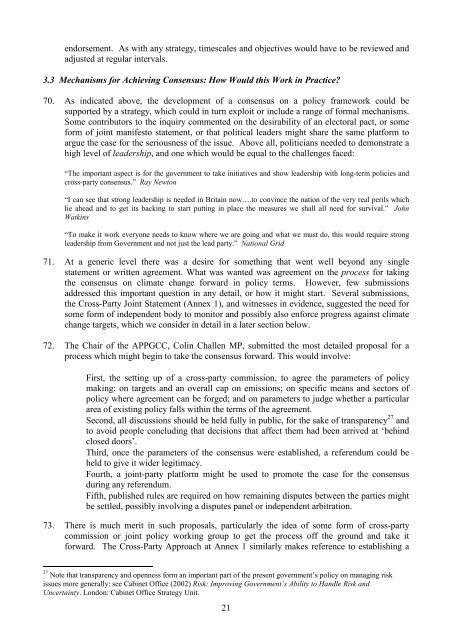All Party Parliamentary Climate Change Group Is a Cross-Party ...
All Party Parliamentary Climate Change Group Is a Cross-Party ...
All Party Parliamentary Climate Change Group Is a Cross-Party ...
Create successful ePaper yourself
Turn your PDF publications into a flip-book with our unique Google optimized e-Paper software.
endorsement. As with any strategy, timescales and objectives would have to be reviewed and<br />
adjusted at regular intervals.<br />
3.3 Mechanisms for Achieving Consensus: How Would this Work in Practice?<br />
70. As indicated above, the development of a consensus on a policy framework could be<br />
supported by a strategy, which could in turn exploit or include a range of formal mechanisms.<br />
Some contributors to the inquiry commented on the desirability of an electoral pact, or some<br />
form of joint manifesto statement, or that political leaders might share the same platform to<br />
argue the case for the seriousness of the issue. Above all, politicians needed to demonstrate a<br />
high level of leadership, and one which would be equal to the challenges faced:<br />
“The important aspect is for the government to take initiatives and show leadership with long-term policies and<br />
cross-party consensus.” Ray Newton<br />
“I can see that strong leadership is needed in Britain now….to convince the nation of the very real perils which<br />
lie ahead and to get its backing to start putting in place the measures we shall all need for survival.” John<br />
Watkins<br />
“To make it work everyone needs to know where we are going and what we must do, this would require strong<br />
leadership from Government and not just the lead party.” National Grid<br />
71. At a generic level there was a desire for something that went well beyond any single<br />
statement or written agreement. What was wanted was agreement on the process for taking<br />
the consensus on climate change forward in policy terms. However, few submissions<br />
addressed this important question in any detail, or how it might start. Several submissions,<br />
the <strong>Cross</strong>-<strong>Party</strong> Joint Statement (Annex 1), and witnesses in evidence, suggested the need for<br />
some form of independent body to monitor and possibly also enforce progress against climate<br />
change targets, which we consider in detail in a later section below.<br />
72. The Chair of the APPGCC, Colin Challen MP, submitted the most detailed proposal for a<br />
process which might begin to take the consensus forward. This would involve:<br />
• First, the setting up of a cross-party commission, to agree the parameters of policy<br />
making: on targets and an overall cap on emissions; on specific means and sectors of<br />
policy where agreement can be forged; and on parameters to judge whether a particular<br />
area of existing policy falls within the terms of the agreement.<br />
• Second, all discussions should be held fully in public, for the sake of transparency 27 and<br />
to avoid people concluding that decisions that affect them had been arrived at ‘behind<br />
closed doors’.<br />
• Third, once the parameters of the consensus were established, a referendum could be<br />
held to give it wider legitimacy.<br />
• Fourth, a joint-party platform might be used to promote the case for the consensus<br />
during any referendum.<br />
• Fifth, published rules are required on how remaining disputes between the parties might<br />
be settled, possibly involving a disputes panel or independent arbitration.<br />
73. There is much merit in such proposals, particularly the idea of some form of cross-party<br />
commission or joint policy working group to get the process off the ground and take it<br />
forward. The <strong>Cross</strong>-<strong>Party</strong> Approach at Annex 1 similarly makes reference to establishing a<br />
27 Note that transparency and openness form an important part of the present government’s policy on managing risk<br />
issues more generally: see Cabinet Office (2002) Risk: Improving Government’s Ability to Handle Risk and<br />
Uncertainty. London: Cabinet Office Strategy Unit.<br />
21
















